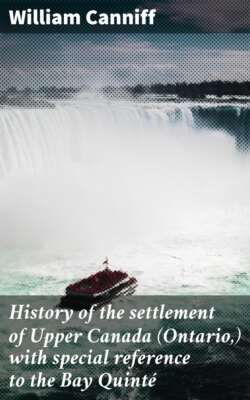Читать книгу History of the settlement of Upper Canada (Ontario,) with special reference to the Bay Quinté - William Canniff - Страница 11
На сайте Литреса книга снята с продажи.
CHAPTER III.
ОглавлениеTable of Contents
Contents—First American Rebellion—Independence—Traitors made Heroes—Loyalists driven away to found another Colony—The responsibility of rebelling—Treatment of the Loyalists—The several Colonies—The first Englishman in America—Receives £10—English Colonization—Virginia—Convicts—Extent of Virginia—First Governor—Virginians not willing to rebel—Quota supplied to the rebel army—New York—Hudson—The Dutch—New Netherlands—Price of New Amsterdam (New York)—First Legislative Assembly—Not quick to rebel—Quota of rebel troops—Gave many settlers to Upper Canada—New Jersey—Its settlement—A battle ground—Gave rebel troops; also loyal troops—Furnished settlers to Upper Canada—Massachusetts—Captain Smith—New England Puritans—The “Mayflower”—First Governor—Cruel treatment of Indians—Massachusetts takes the lead in rebelling—Troops—Loyalists—New Hampshire—Troops—Delaware—Settlement—Quota of rebel troops—Connecticut—Education—Troops—Roman Catholics—Toleration—Rhode Island—Providence—Inconsistency of the Puritans—Roger Williams—North Carolina—Inhabitants—South Carolina—Many loyalists—Pennsylvania—William Penn—Conduct toward Indians—The people opposed to rebellion—Georgia—Oglethorpe—Policy of England—New England.
In the introductory chapters a brief sketch has been given of the settlement of America. We now approach the important events which belong to the first great American rebellion, which culminated in the Declaration of Independence by the thirteen British American Colonies, and terminated in the recognition of their independence by the parent State. The rebellion had resulted in a revolution, and traitors were made heroes!
It forms a part of the present undertaking to record some of the facts relative to the steps by which the now powerful United States were, as a whole, ushered into the arena of nations, and by which a large class of Americans, true to their British allegiance, were compelled to leave their native country to found another colony in the northern wilderness. To be justified in rebelling against the constituted authorities there must be the most cogent reasons; to take up arms against the State—to initiate a civil war, is assuming the most fearful consequences.
To present even a brief account of the circumstances which led to the settlement of Upper Canada, it becomes necessary to dwell for a time upon the great rebellion of 1776, the result of which was adverse to those Americans who adhered to the old flag under which they had been born, had come to the new world, and had prospered; a rebellion which was attended and followed by persecution and violence, imprisonment and confiscation, banishment, and, too often, death; which caused a stream of refugee loyalists to set in toward the wilderness of Canada.
At the time of the rebellion of the English colonists in America, they consisted of thirteen provinces. Massachusetts, with her colony of Maine, New Hampshire, Rhode Island, Connecticut, New York, New Jersey, Pennsylvania, Delaware, Maryland, Virginia, North Carolina, South Carolina, and Georgia. It may be well to briefly notice these several states, and the part each took in the war for Independence.
The first Englishman to set foot upon the continent of America was John Cabot, who discovered Newfoundland, and probably the adjacent mainland, June 4, 1497. The event is noticed in the Privy Purse expenditure thus: “1497, Aug. 10—To hym that found the new Isle, £10,” which seems to have been a grant for his services.
